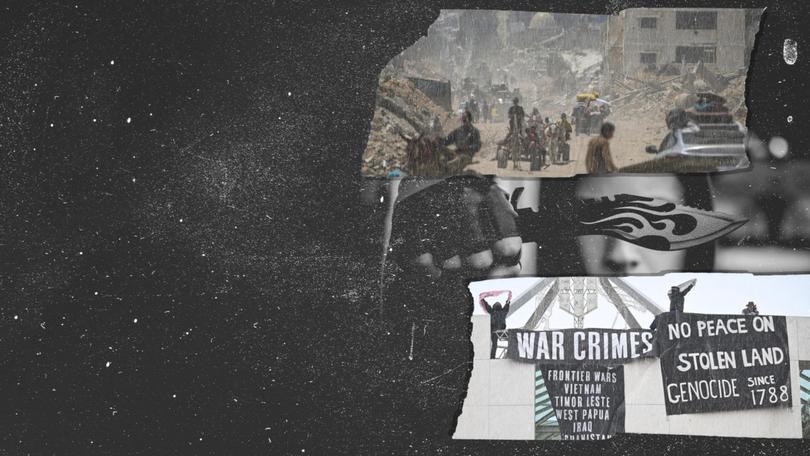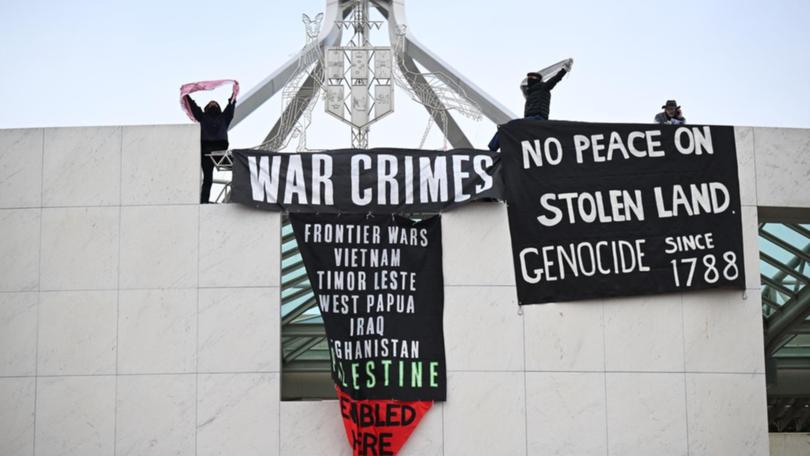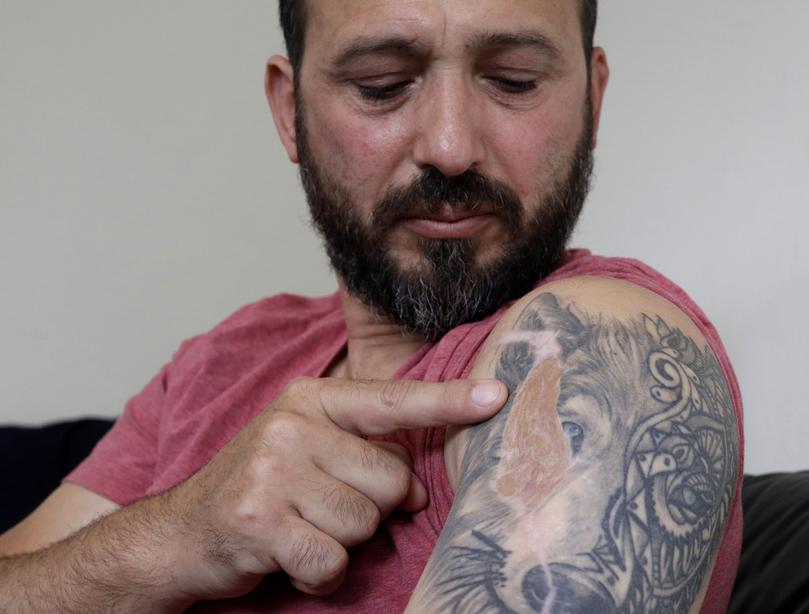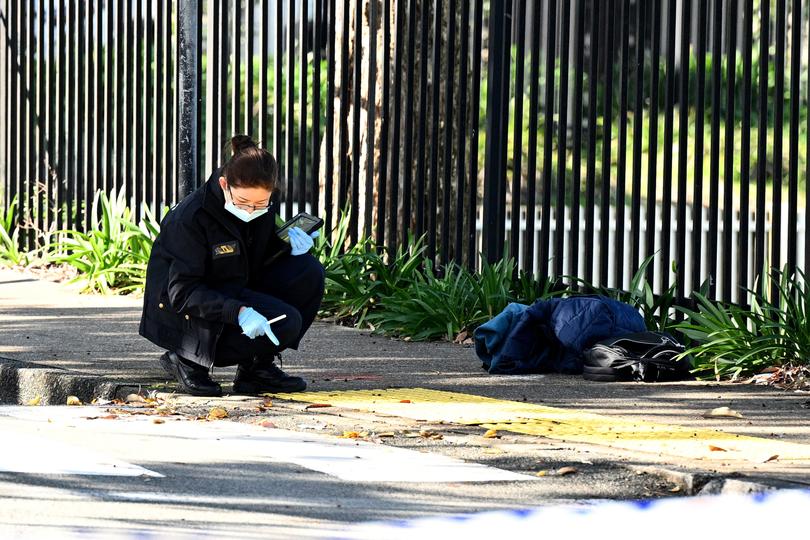Violent extremism, terrorism and deradicalisation programs: The lessons lost in the battle for young minds
Temel Atacocugu was praying at a mosque in Christchurch when he was shot nine times. Five years on, his assailant’s radical views are still poisoning our youth.

Temel Atacocugu was praying at the Al Noor mosque in Christchurch when he was shot nine times by Australian terrorist and white supremacist Brenton Tarrant on March 15 in 2019.
He remembers seeing the bodies of 51 Muslim men, women and children strewn across the floor as the place of worship became a war zone. The youngest victim was three-year-old Mucaad Ibrahim.
Mr Atacocugu, who suffers from post-traumatic stress disorder and has lost count of the number of surgeries he had undergone to repair the damage left by Tarrant’s bullets, said his life turned upside down in an instant.
Sign up to The Nightly's newsletters.
Get the first look at the digital newspaper, curated daily stories and breaking headlines delivered to your inbox.
By continuing you agree to our Terms and Privacy Policy.“It was a nice, sunny and warm day and I felt happy,” says Mr Atacocugu, who was born in Turkey.
“But a few hours later I felt helpless, scared to die and in pain. My life was changed and upside down.
“I was a healthy and strong man in the morning and in the afternoon I was struggling to survive.”
Vision of the men, women and children slain at the Al Noor mosque flooded social media feeds in the aftermath of the massacre.
It had been captured by Tarrant who had also released a depraved white nationalist manifesto on social media in an effort to spawn further atrocities.
It may have worked.
On Tuesday a 14-year-old likely radicalised by a melange of online extremist ideologies walked into the University of Sydney and allegedly stabbed a student in the neck with a kitchen knife in a random attack.
Reports have since emerged that the teenager had previously been charged over alleged plans to execute an attack inspired by Tarrant and the Christchurch massacre but were dropped. The 14-year-old was instead put into a deradicalisation program.
Less than a week earlier Jordan Patten armed himself with knives and tactical equipment before filming himself entering the office of Newcastle MP Tim Crackanthorp. The 19-year-old had also been allegedly inspired by Tarrant.
It is alleged Patten circulated a 200-page extremist manifesto to the media and made a number of social media posts detailing plans to behead Labor MPs and threats to the family of Prime Minister Anthony Albanese.
Experts say there isn’t a single pathway trod by young people into violent extremism and the internet is just another space where adolescents can meet and be exposed to ideas and material.
Victoria University professor Debra Smith said young people were accessing violent extremist material online, including videos of the Christchurch massacre, beheadings, suicides and Mexican drug cartel shootings.
“What we’re seeing is this coming together of normal adolescent developmental processes taking place in an environment where they can come into contact with all this extremist material,” says Professor Smith, stressing that a young person actually committing an offence after viewing material remained a very rare phenomenon.
“Even if a young person is not going to do an act of violent extremism, it’s inherently bad for them to develop their identity in these extremist movements.”
The two recent attacks come after months of ongoing conflict in the Middle East have been broadcast without filter on social media feeds, with images of dead children and annihilated villages shared alongside photos of food and animals.
Misinformation is rife and the national mood is febrile.

This week pro-Palestinian protesters wearing keffiyehs scaled Parliament House in Canberra and camped outside Prime Minister Anthony Albanese’s electorate office in Sydney.
WA Labor Senator Fatima Payman quit the party after Mr Albanese suspended the Muslim woman for crossing the floor to back a Greens motion on Palestinian statehood in a bid to end an almost two-month-long saga that has ripped narrative control from the PM.
Senator Payman, the first woman to wear a hijab in the Australian Parliament, says she quit because of the Government’s indifference towards the Gaza conflict that has killed 38,000 Palestinians as well as Australian aid worker Zomi Franckom.
The Senator, who will remain as an independent, says she had no intention of joining a group called The Muslim Vote that aimed to unseat sitting Labor MPs in electorates with a high proportion of Muslim voters, including Blaxland and Watson in Sydney.
Teal independents unseated Coalition MPs in some electorates with high proportions of Jewish voters in Australia, including Wentworth in Sydney and Goldstein in Melbourne, at the last election.
Josh Burns, the Labor MP for Macnamara, has been vocal in his support of Israel and a two-state solution amid the ongoing conflict. About two weeks ago pro-Palestinian activists smashed the windows of Mr Burns’ office in the Melbourne suburb of St Kilda, scrawling “Zionism is facism” across an image of the Jewish politician’s face.
Mr Burns says that it was crucial that Australians retained the ability to talk to each other and have difficult conversations about the war between Israel and Palestine.
“The conflict is not a licence to abuse people, to scream at them or to post hateful messages online,” he says.
“It’s much harder to have a conversation with someone who may disagree with you than sit on your phone and have your own views reinforced to you.
“But if we can’t have difficult conversations and negotiate what hope can we have for that to occur in the region.”

The war between Israel and Palestine was triggered when Hamas attacked civilians on October 7 last year, killing 1200 people and taking about 250 hostages.
Ron Finkel AM is the founder of Project Rozana, an organisation dedicated to improving relationships between Israelis and Palestinians through healthcare that he runs with prominent Muslim leader Dr Jamal Rifi.
Mr Finkel says there were about a million Australians, including 800,000 Muslims and about 120,000 Jews, who were stressed and talking at, not with each other.
“There’s a strong tendency to circle the wagons when you feel under attack,” he says.
“And from the point of view of the Jewish community, the Jewish community feels very embattled at the moment.”
Mr Finkel says he was concerned Australians were being consumed by an overseas conflict and said the nation needed to find a pathway forward.
“The tears in the fabric of social cohesion need to find a thread to repair them,” he says.
“It’s [social cohesion] not torn asunder, it can still be sewn together but you have to have a thread of willingness to make it happen.”
The University of Sydney attack this week came after months of rolling student encampments in support of Palestine and fears the ongoing war with Israel would bleed into Australia and endanger the nation’s Jewish citizens amid rising antisemitism.
But the victim wasn’t Jewish or Palestinian.

Psychology graduate Melvern Kurniawan, 22, was walking to the Brain and Mind Centre where he is completing an internship when he was allegedly stabbed once in the neck by a teenager wearing army fatigues.
Mr Kurniawan, a high achiever studying brain disorders, was released from the Royal Prince Alfred Hospital on Tuesday and is recovering at his family home in Sydney’s Hills district.
NSW Police have chosen not to designate Tuesday’s incident as terrorism unlike arrests made after a teenager stabbed Assyrian Bishop Mar Mari Emmanuel at the Christ the Good Shepherd Church in the southwestern Sydney suburb of Wakeley.
Instead NSW Police Assistant Commissioner of Counterterrorism Mark Walton issued a warning to parents that an increasing number of youths aged between 12 and 16 were emerging in counter-terror investigations due to the toxic influence of the internet.
“They (children) are embracing violent extremist ideologies and moving towards violence,” he says.
Violent extremists continue to spread messages and propaganda online and seek to influence individuals to act violently locally.
“I urge parents they be aware of this risk to their children. We ask that everyone be concerned about this and reach out to authorities if they are concerned about the current consumption of extremist ideologies.”
The alleged attack on Bishop Emmanuel, a TikTok celebrity, by a potentially radicalised teenager on April 15 was live-streamed and watched by possibly millions of people.
eSafety Commissioner Julie Inman Grant, the nation’s internet cop, lost a high-profile battle against tech billionaire Elon Musk to delete the extremist material from social media platform X’s servers, removing it from the internet.
In May this year, a radicalized 16-year-old who had been in a deradicalisation program for two years walked into a Bunnings carpark in the southern Perth suburb of Willetton and stabbed a man.
WA Police shot dead the teen who had days earlier told friends “I am going on the path of jihad tonight for the sake of Allah”.
Home Affairs Minister Claire O’Neil said preventing a young person who had been radicalised from committing violence was incredibly hard.

“We need to keep assessing the success of these programs, but we also need to be throwing everything we can at the problem of youth radicalisation,” she said.
“For every act of violence that occurs and makes the news, there are many which are successfully thwarted by our law enforcement, intelligence and security agencies, who do incredible work keeping our community safe.”
More than a decade ago, the Islamic State disseminated propaganda videos and images of beheadings on social media feeds in a bid to inspire a global jihadi movement.
On December 15, 2014, wannabe preacher, serial pest and sex offender Man Haron Monis walked into the Lindt Cafe in Sydney’s Martin Place with a shotgun in his backpack and took staff and employees hostage.
The siege lasted 16 hours, claimed the lives of Tori Johnson and Katrina Dawson and shattered an illusion of safety not fully appreciated in the lucky country.
In the days leading up to the siege, Man Haron Monis had made a series of social media posts to which the National Security Hotline was alerted, including one that said “ALLAHU AKBAR Team Islam Against Oppression.”
In 2015 the Federal Government introduced the Living Safe Together Intervention Program which aimed to counter the risk of violent extremism among low and medium-risk people living in the community. Data on the success of the deradicalisation initiative was not available at the time of writing this piece.
“The consequences of youth radicalisation are very real — both for the community and the individuals involved — we are dealing with some of the most vulnerable members of our community,” says a Home Affairs spokesperson.
“Violent extremists continue to spread messages and propaganda online and seek to influence individuals to act violently locally.”
In Christchurch, Mr Atacocugu says he last visited the Al Noor mosque for the fifth anniversary of the massacre last year.
The visit triggered his PTSD, bringing horrific flashbacks followed by a deep depression. After the attack, he lost his business and relationship as he underwent countless surgeries.
Tarrant shot Atacocogu in the mouth, left arm and both legs. He is disabled in his left arm and suffers from nerve pain as well as anxiety. He avoids crowds and prays at home.
“It’s not easy life, all the simple things I could handle before are now so difficult,” he said.
“People think sometimes that after five years life is normal… You lose your confidence and you can’t be normal.
“This is our new normal life. If I want to deal with something they put me in high stress and anxiety. It is challenging dealing with normal basic things.”
Mr Atacocugu, who was photographed with then New Zealand PM Jacinda Ardern from his hospital bed, said government support for him and other victims had more or less disappeared six years after the massacre.
Despite his injuries and daily struggles, Mr Atacocugu remains hopeful that education can solve racism and prevent another tragedy.
“I hope this does not happen again,” he said.
“Every government, doesn’t matter whether Australia or New Zealand, has to tighten gun laws.
“And also the government has to not tolerate racism or or any kind of radicalisation. They have to be very careful and educate in high school, primary school and kindergarten that we are all equal and human.”

